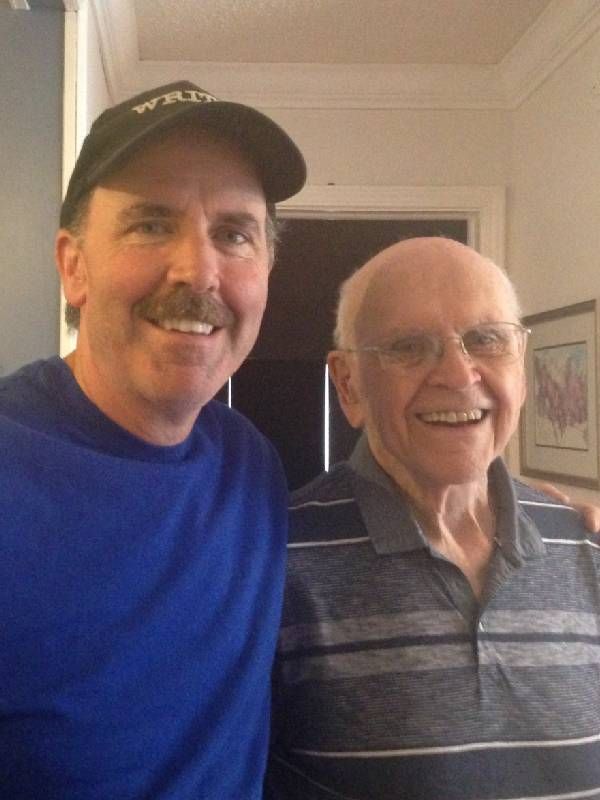My Father's Legacy of Optimism
In my late father's optimistic world view, 'sunshine is the default'
Some memories remain fresh for decades.
When I took my first airplane flight as a child with my father, the sky was a blanket of dark gray. As we ascended through the layers of clouds, I was gobsmacked by what suddenly appeared outside my window: the sunny blue sky! It was the first time my child-brain realized a gray sky did not mean the sun was absent — it was just hidden.

I turned to my father to share this astronomical hide-and-seek revelation, and he was amused. Together we chatted about how yes, the sun is always "above" the clouds, even on the darkest and rainiest of days. Hence, in some ways "every day is a sunny day," I surmised, and he did not disagree.
He would acknowledge the world's problems, but he would also take action with unflagging optimism for the future.
This example of my father's gentle scaffolding of my childhood reasoning and budding optimism is one of my favorite memories of him. Sadly, he passed away a couple years ago at age 92, and what I miss most is his optimism about the world even in the face of our culture's penchant for pessimism.
Let's face it: Today's "bad news" media saturation can be overwhelming — environmental degradation, political rancor, civil and religious strife, etc. But my father was a model of optimism for nearly a century, from fighting for civil rights in the 1960s to joining a group called "Beyond War" in the 1980s to self-publishing an environmental newsletter in the 2010s. He would acknowledge the world's problems, but he would also take action with unflagging optimism for the future.
Themes for an Optimistic Life
So imagine my solace when I was going through his beloved book collection after his death and found one titled "What Are You Optimistic About? Today's Leading Thinkers Lighten Up." Edited by John Brockman, the book asks a variety of scientists and commentators what they are optimistic about in today's world.
Among its many topics, the book conveys several of my father's themes for an optimistic life:
1) Start with gratitude
It's easy to forget all the scientific advances we take for granted. Examples include the democratization of knowledge via the internet and the significant improvements in infant mortality rates, gene research and healthy aging. When I was a kid, I fantasized about jet packs and video phones. While we're still waiting for jet packs, take a moment to appreciate FaceTime. (Indeed, my "sunshine is the default" moment would not have happened without the technological wonder of air travel.)

As Kai Krause notes in the book, every so often be sure to re-appreciate the smartphone. In our pockets we now have our "own diviner of answers to any question, finder of any fact, in minutes or even seconds, an advisor like no Sun King or emperor, kaiser or pharaoh, could ever buy with all the gold in his empire."
2) Take the long view
Sometimes using a wider perspective can help reframe today's problems. For example, even though large-scale issues like disease, war and poverty persist, when viewed historically our era has improved in many of these departments. In the book, Chris Anderson adds that most "reporting of trends shows a world that is getting better. We live longer, in cleaner environments; we are healthier; we have access to goods and experiences that kings of old could never have dreamed of."
The long view can also help remind us of the power of human imagination. As Alison Gopnik explains, "the greatest human evolutionary advantage is our innate ability to imagine better alternatives to the current world." She notes that "everything in the room I write in now . . . was once imaginary, no more than an optimistic pipe dream."
3) Remember to laugh along the way
Robert Provine advocates an unusual, humorous mindset to help stay optimistic: "Things could always be worse." In a counterpoint to Gopnik's celebration of imagination, Provine states: "We have all heard of the 'grass is greener' syndrome. This is its 'grass is browner' counterpart, the achievable antidote for broken dreams and bolsterer of the status quo."
Provine's amusing approach reminded me of another decades-old memory, this time from my teen years. While working at a grocery store, I saw two men who looked to be in their 80s approach each other slowly. They were obviously friends because the one greeted the other by saying with a smile: "I should just tell you what doesn't hurt today!" As they laughed, I thought: That's how I'd like to be at their age! It may not have been full-throated optimism, but their interaction modeled how humor and gratitude can "bolster" the status quo.
Like light still traveling from an extinguished star, his guidance continues.
Speaking of the "status quo," however, it's important to note that optimism should never be a naïve, head-in-the-sand mindset. We are not, after all, "beyond war" as a species. And as my father's activism shows, he was usually in favor of improving the status quo. But the problems of the world can keep knocking us down if we don't find ways of picking ourselves up, dusting ourselves off, and optimistically continuing to try to improve the world.
I'll never forget one day in my 20s when I did not yet have children. I saw one of my wife's friends with her two young daughters. The mother was a very petite woman, and the older child was already approaching the same size as her mother. Suddenly, the girl implored her mother: "Pick me up!"
The mother grimaced and looked at me. In my surprise, all I could think to say was "what do you do when your kids get too big to pick up?" She sighed, smiled, put out her arms, clumsily raised this daughter who was almost larger than herself, and said: "You just keep picking them up."
That is how I felt upon finding my father's book about optimism. There he was, parenting me from beyond the grave, metaphorically picking me up again and pointing me in a sunnier direction. Like light still traveling from an extinguished star, his guidance continues.


